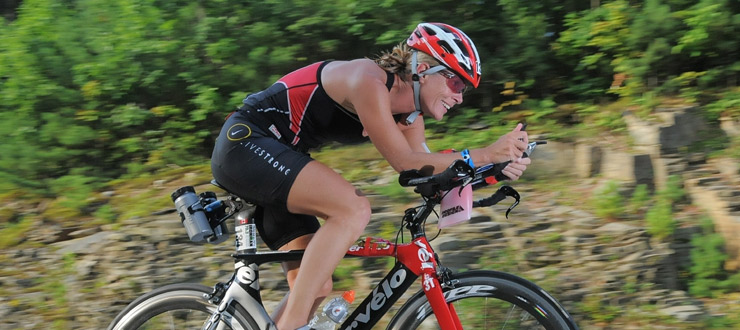
Sindy Hooper completed an Ironman while on chemotherapy, garnering great media attention and raising money to support cancer research by Dr. John Bell.
Sindy Hooper was in top shape in January 2013 when she registered for an Ironman Canada race. But then she was diagnosed with pancreatic cancer – one of the worst cancers to get.
The average survival after a pancreatic cancer diagnosis is only six months, and 75 percent of people die within the first year of their diagnosis. The five-year survival rate is only six percent.
Hooper was a candidate for a Whipples procedure. The Ottawa Hospital is one of the few hospitals that offer this complex surgery. The 7.5-hour surgery removed half of her pancreas, a third of her stomach, her gallbladder and part of her small intestine.
Following her surgery, Hooper underwent 18 rounds of chemotherapy and 28 days of radiation. She coped with the horrible fatigue and nausea from the cancer treatments by swimming, biking and running. She recovered by training for the Ironman. And her goal focused not only on completing the event but also on raising money and awareness for pancreatic cancer.
On Aug. 25, 2013, between her 15th and 16th rounds of chemotherapy, Hooper completed the Ironman Canada in 16.5 hours. Completing an Ironman while on chemotherapy garnered great media attention, and she raised $48,000.
“It’s been two-and-a-half years since my diagnosis, and I feel like each month that passes is another month that I’ve cheated death,” said Hooper.
There is no cure for pancreatic cancer, today. But the future is promising thanks to Dr. John Bell’s research.
Dr. Bell, a senior scientist at The Ottawa Hospital, has been developing viruses that kill cancer cells without harming healthy cells. These oncolytic viruses have the potential to effectively replace chemotherapy with substantially fewer side effects.
Hooper is raising money to support Dr. Bell’s oncolytic virus research. Her “Marathoners Gone Viral” team of 130 runners raised $111,000 at the 2015 Ottawa Race Weekend.
“I believe that a cure for cancer is coming,” said Hooper. “And Dr. Bell and his team are working on “when.”

Support patient care and research at
The Ottawa Hospital


 To reset, hold the Ctrl key, then press 0.
To reset, hold the Ctrl key, then press 0.